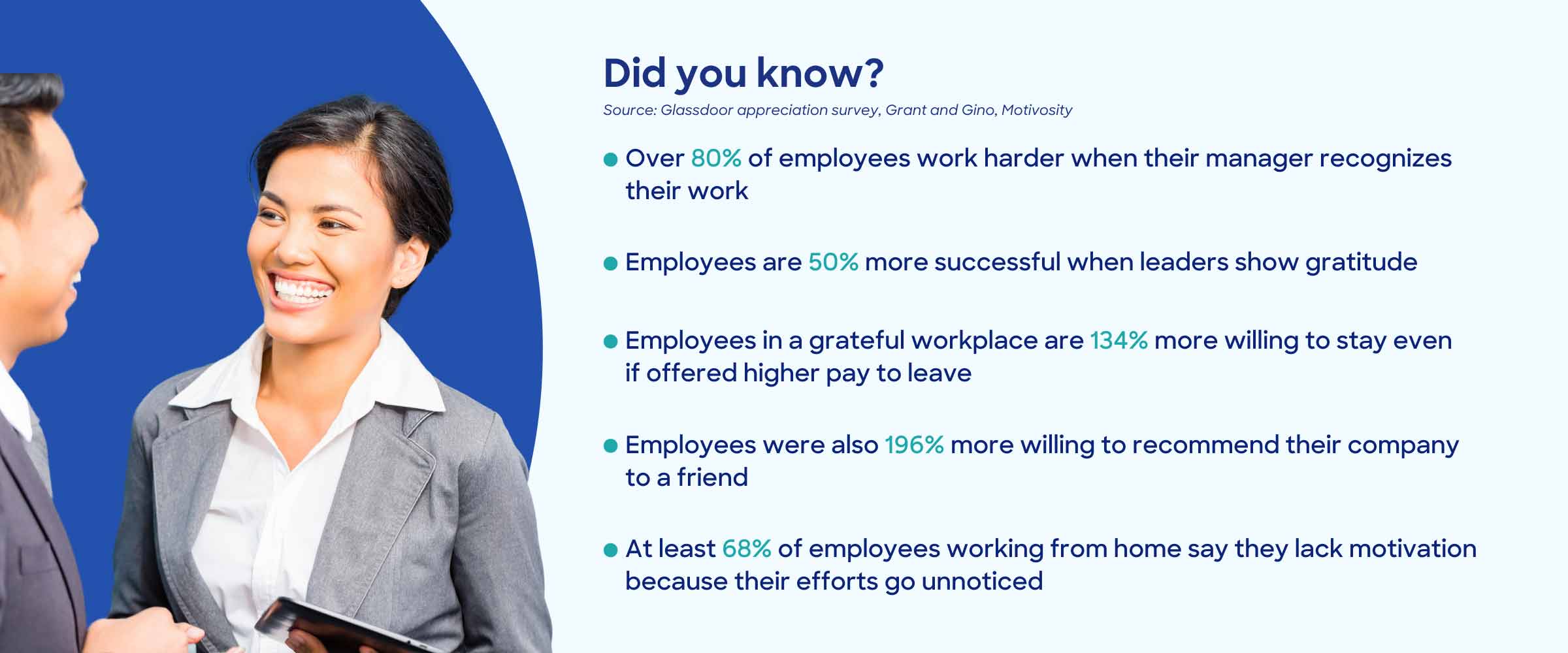How a culture of gratitude can do wonders in business
Showing appreciation and gratitude to the people may sound simple, but you’d be surprised at what a genuine “thanks” can do for your organisation.
Remember the first time in your career when someone at the office appreciated your work? It felt warm, refreshing, and motivating – it made you want to do better, and it made you believe that you can.
Feeling appreciated and valued is a basic human need. Science even says it is good for you as praise improves your wellbeing, reduces stress, and makes you more resilient.
In a corporate setting, showing gratitude can be a building block of culture, a foundation for good relationships at work that will bind people closer to each other.
The quality of the relationship between executives, managers, and people improves when everyone shows appreciation for one another.
Good work relationships make people stay because they would associate the workplace with a safe space where they can be at ease, Nina added.
The recent “Great Resignation” phenomenon showed us how work without good, meaningful relationships can lead to high attrition rates.
“Without a culture of gratitude, people will be less committed and more likely to get tired of work that feels more like a boring and unfulfilling routine,” Nina said.
The more committed people are, the more likely they are to stay, and become loyal and grateful employees. In time, they can become your brand’s ambassadors.
Nina, who has over a decade of experience in managing people, said she has seen firsthand how a simple “thanks” can motivate a group of people to produce better work.
“Skill and will is a very simple concept. Companies naturally hire skilled people. But the ‘will’ part is driven by extrinsic motivations where managers have direct influence,” she said.
“If we can motivate our people that way, they will find all the will and reason to be high performers, consistent, and provide quality results,” she added.
Simple ways of showing gratitude
Gratitude doesn’t always have to be grand or extravagant. In fact, some of the most impactful expressions of thanks are simple and straightforward.
“Just a simple word or giving a pat on the back or just physically being with your team – that already means a lot,” Nina said.
“Having weekly touchpoints also can help you know more about the hardships they face. You then appreciate their efforts more,” she added.
So, here are great yet simple ways of showing gratitude to people at the workplace.
Commend your people
Giving team members a pat on the back, even for the tiniest of accomplishments, will boost their morale. Send them a personal message when congratulating them. Give them awards if you have company events. Showing your appreciation doesn’t have to be expensive, but it must be sincere.
Celebrate with your team
Greet your staff on their birthday. Acknowledge and celebrate other important dates and milestones in their lives. This shows how much you treasure their presence in the company.
Treat your staff
Whether it’s someone’s birthday or it’s just one of those stressful days at work, treating your people to lunch or coffee is always a welcome idea. Group lunches are great for building camaraderie while one-on-ones are perfect for showing appreciation on a personal level.
Give a raise, promote your people
Nothing screams “we appreciate you” louder than a promotion or a raise. It shows the employees that you acknowledge their contributions, the efforts they put into improving their work, and their willingness to serve even during stressful times.
Train your managers
The Great Resignation of 2021 taught us that empathy is an important skill that managers should develop. So, collaborate with supervisors and team leads to discuss how they can appreciate their people more.
Gratitude starts from the top
Cultivating a culture of gratitude may sound simple, but it needs to begin with concrete action and efforts from the top management, Nina stressed.
It’s the people, from top and middle management, going out of their way to build solid work relationships with employees that foster a culture of gratitude.
“Some companies are purely focus-driven. They don’t build relationships with people. And it makes the work environment quite robotic and numbing,” Nina said.
“Building relationships impacts interactions at work. It goes personal. Employees feel they have a safe space. It really goes beyond professional relationships as some even evolve to friendships,” she added.
Nina also underscored the importance of middle management in fostering a culture of gratitude in the workplace, as they are the people who interact daily with the staff.
The best way to cultivate a culture of gratitude is to adopt a servant leader mindset where managers don’t act as “bosses” but as guides in the workplace.
“Everyone will then follow the example. Everyone will be willing and ready to roll up their sleeves regardless of their position,” Nina said.















